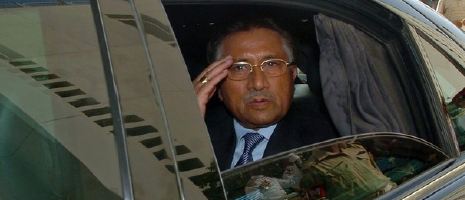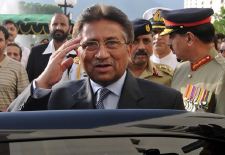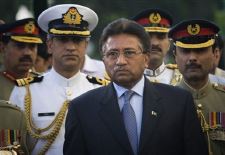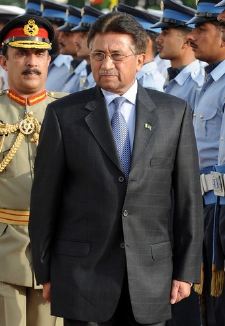Adil Najam
In a nationally televised speech, Gen. Pervez Musharraf, President of Pakistan, has just announced his resignation, pre-empting a move to impeach him by the parliament.
This post has been updated to add news photos from this momentous day in Pakistan’s political history. The pictures speak eloquently of the moods and thoughts of the day. (Scroll down to see the video of Gen. Musharraf’s resignation speech).
Participate in a poll on what might be Pakistan’s future post-Musharraf, here.
![]()
Here is a Pervez Musharraf time-line, published in The News:
August 1943: Born in Delhi, India
1964: Joins Pakistani army.
1998: Becomes army chief of staff.
October 1999: Seizes power in a bloodless military coup, overthrowing the prime minister, Nawaz Sharif. In response, the Commonwealth suspends Pakistan’s membership.
June 20 2001: Makes himself president, replacing Rafiq Tarar, while remaining head of the army. Tarar is forced out of office when the parliament that elected him is dissolved.
July 2001: Holds first meeting with the Indian prime minister, Atal Bihari Vajpayee, at Agra in India. No progress is made because of differences over the disputed territory of Kashmir.
September 2001: George Bush courts Musharraf, asking him to join him in his “war on terror” and help defeat the Taliban in neighbouring Afghanistan. The US president promises Pakistan $1bn in aid.
April 2002: Wins a referendum giving him another five years in office. Observers criticise the referendum as blighted by irregularities.
May 2002: Pakistan test fires three medium-range surface-to-surface missiles capable of carrying nuclear warheads. Musharraf insists his country would not be the one to initiate war.
August 2002: Consolidates his power still further, giving himself the right to dismiss an elected parliament.
October 2002: Pakistan’s first general election since Musharraf seized power in 1999 results in a hung parliament.
November 2002: Mir Zafarullah Jamali becomes the first civilian prime minister since 1999. He is a member of a Musharraf-supporting party.
November 2003: Pakistan’s National Assembly meets for the first time since 1999.
December 2003: Musharraf promises to step down as head of the army by January 2005.
May 2004: Pakistan is readmitted to the Commonwealth.
December 2004: Musharraf announces he will stay on as head of the army.
August 2005: Pakistan tests its first nuclear-capable cruise missile.
March 2007: Musharraf suspends the chief justice, Iftakar Mohammed Chaudhry, triggering a wave of anger across the country and the first joint protests held by the parties of exiled former prime ministers Benazir Bhutto and Nawaz Sharif.
October 2007: Signs a corruption amnesty, opening the way for Bhutto’s return and a possible power-sharing agreement. Within hours of Bhutto’s arrival back in the country, bombers attack a Bhutto rally in Karachi, killing more than 100 people.
November 2007: Declares a state of emergency, rounding up opposition leaders at gunpoint. In the same month, Musharraf quits as head of the army, becoming a civilian president.
December 15 2007: Lifts state of emergency and announces plans to go ahead with parliamentary elections scheduled for January 8.
December 27 2007: Benazir Bhutto is assassinated at an election rally in Rawalpindi.
January 2008: Elections postponed until February 18.
February 2008: The two main opposition parties gain a clear majority in the elections.
August 2008: The two main parties strike a deal to impeach Musharraf if parliament backs the move.
August 18 2008: Musharraf announces his resignation



























































> I
After reading all the comments of Musharraf’s supporters, I made some observations.
First, they don’t even mention the controversies surrounding Musharraf’s rule! They talk of the free press, but they don’t talk of the abused TV reporters and journalists. They’re more interested in talking about how Musharraf made some admittedly much needed progress for woman rights, but sacked the judiciary and judges (guess what, if we don’t have a functioning law system, then what he did for women doesn’t mean an iota). In short, like Musharraf himself in his resignation speech, they believe in self-created delusions where Pakistan was some blooming nation of prosperity and flowing rivers of milk and honey. Go out in the streets of Pakistan and see what your beloved dictator has achieved! The truth is in front of you, time to face the facts and improve democracy in Pakistan just like Musharraf did by removing himself from the process.
Yasser Latif Hamdani, thanks for being one of the few sane and reasonable voices in here. Among the mindless Musharraf supporting drones, it is very hard to find credible argument.
Dictatorship has failed everywhere it has been tried. History can attest to that, and now we can add Musharraf’s name to the list. Even if we give credibility to the supporters of army rule, that democracy has not brought prosperity to Pakistan, and thus a dictatorial rule is necessary – we need only look at the most tumultuous years of Pakistan’s history to witness that those who brought Pakistan to ruin have been none other than army generals.
Like someone here said before, the ignorance on display here is astounding!
Faisal says:
> I would rather have been ruled by a democratic dictator
What exactly is a democratic dictator? That’s an oxymoron for you, right there!
another dictator bites the dust!
In 1912, as a Congressman and an Indian Nationalist (and Pakistan’s future founder) Jinnah went to London to lobby for the Indian Representatives Bill calling for expansion of the viceroy’s council to include elected non-government Indian representatives with no reservations or privileges or differences. He was rebuffed and the bill was rejected by the House of Commons causing Jinnah to bemoan that India was the only country in the civilized world without representative rule.
The British logic was that Indians were not ready for it. Ofcourse a few years later they were forced to accept it. Today 96 years later, to read not some British imperialist but fellow Pakistanis- few and far between thankfully- the same logic is indeed ironic and shows the true measure of Pakistan’s failure.
The nay-sayers… are now pointing to Asif Ali Zardari’s corruption… the chance that the next president might be his sister… or Nawaz Sharif’s failings to point out why Musharraf’s departure was not a good idea… the reason why corrupt and mediocre politicians have ruled the roost and have not been ousted yet is because the system has not been allowed to work.
Let us have faith in representative rule … for god’s sake… we’ve tried military dictatorships for close to 34 years out of our 61 year history… if Pakistan is a mess… it is more the fault of these military rulers than civilians. Some genius came up with the sound byte that “I prefer a democratic dictator over despotic democrats”… what stupidity… first of all the “democratic” credentials of dictator Musharraf leave a lot to be desired… secondly even if this was the case… the “despotism” of civilian democrats can be taken as an example of the strength of a civilian politician… a civilian politician derives his strength from the people… a military dictator does so by virtue of military might… a democratic military dictator is a misnomer… and is actually a military dictator without control.
So lets have faith in representative rule… instead of looking for a savior in shining armor or Khaki what have you.